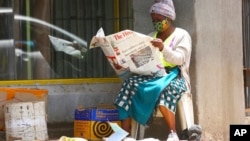Zimbabwe’s government is urging citizens to take part in a free, voluntary COVID-19 vaccination program starting "immediately," now that the country has received 200,000 doses donated by China. But some citizens remain skeptical.
Zimbabwe College of Public Health Physicians welcomed the government’s three-phase inoculation program, which starts with frontline workers at high risk of infection – such as doctors and nurses – and will be followed by those with chronic diseases, the elderly and the prison population.
The second phase is for those at medium risk, and the third phase covers everyone else willing to be vaccinated.
Dr. Nyika Mahachi of the physicians college said he hoped there wouldn't be any deviation from the program.
Efficacy questions
Some health experts have questioned the efficacy of the Sinopharm product. Mahachi said nevertheless that "while we are in an emergency situation, while even the efficacy [of the Sinopharm and Sputnik V vaccines] is not known," it was important "for us to be at least vaccinating the population. The other concern around these two vaccines is obviously their effectiveness against the South African-originating variant. We are expecting that the country benefits from the COVAX facility as well as the African Union facility so that we also have other known vaccines that have clear data.”
On television Friday night, Zimbabwe’s deputy health minister, Dr. John Mangwiro, said that to reduce COVID-19 infections and deaths – which as of Saturday were at 35,045 and 1,393, respectively, according to the Johns Hopkins University Coronavirus Resource Center in the U.S. — the government was introducing the voluntary, free-of-charge COVID-19 vaccinations.
“The Sinopharm vaccine, which has proven to be effective in clinical trials and has efficacy rate ranging from 76% and 86%, has already been used by other countries in controlling COVID-19," he said. "The government is in advanced negotiations to acquire the Sputnik V vaccine from Russia, which is also effective against COVID-19.
"In addition, the country is also pursuing global and regional facilities to secure more vaccines to cover all eligible people. May I conclude by encouraging all eligible people in the country to take up the vaccine when their turn comes."
Some have doubts
It might be a long while before some Zimbabweans comply. One of the reluctant ones is Mufaro Mutsigiri, 53.
“We prefer to live the way we were living because, if I am vaccinated, does that stop the spread?" Mutsigiri asked. "Or will people die? Answers aren’t said out!”
Some of the reasons are not scientific, though, as in the case of Dillion Machingura.
"The thing is, there have been rumors about people who have been taking the vaccine ... so I am not sure if it is safe to take it or not," Machingura said.
But others are eagerly waiting for it, such as Edwin Nyambuya.
"I will take that vaccine," he said. "I think it’s effective. The disease COVID-19 started in China. It has been used there and it’s proving to work. So, I believe it works.”
Zimbabwe’s government says it plans to immunize 60% of its estimated population of 14 million in the hope of achieving herd immunity.




